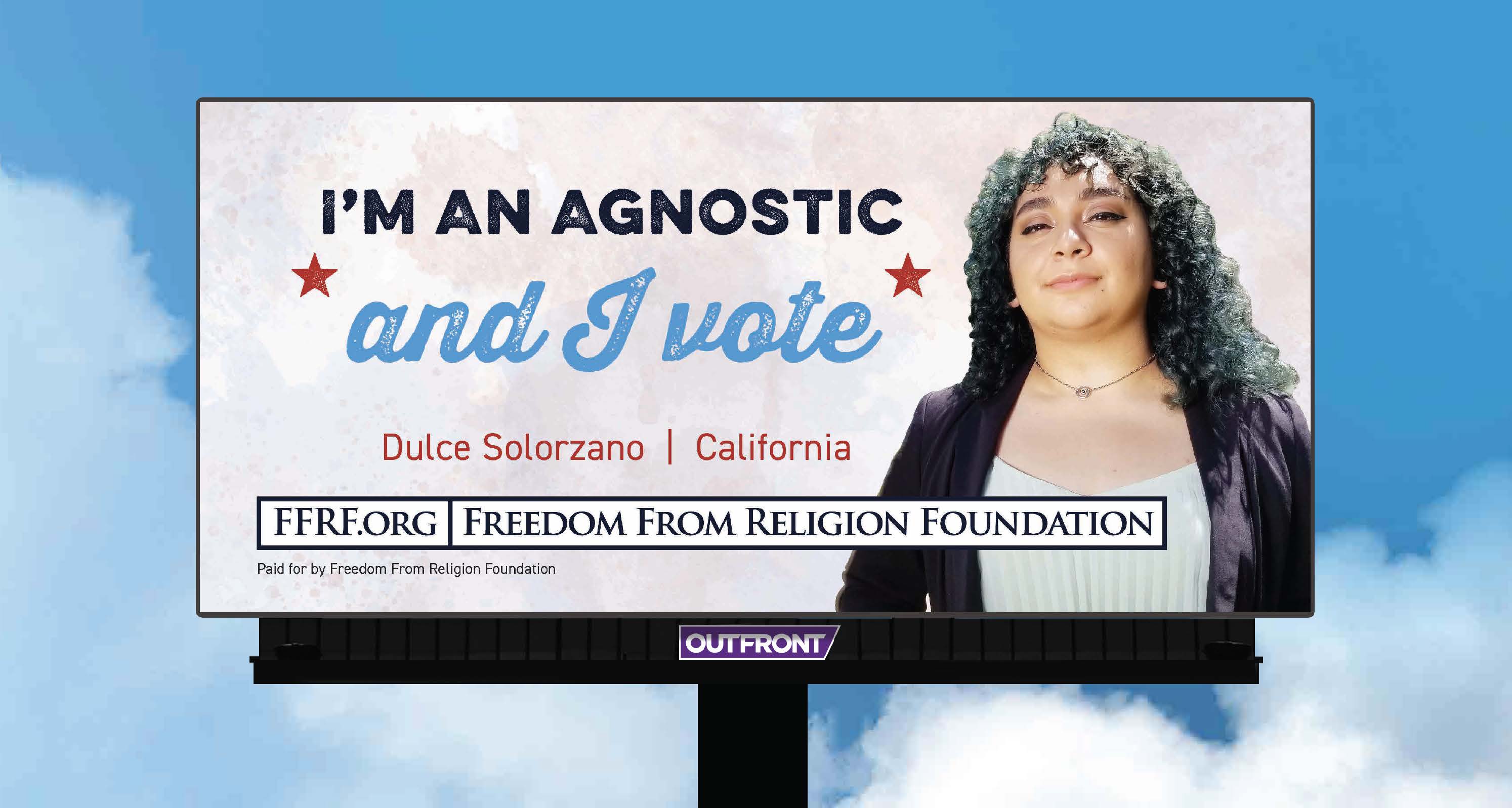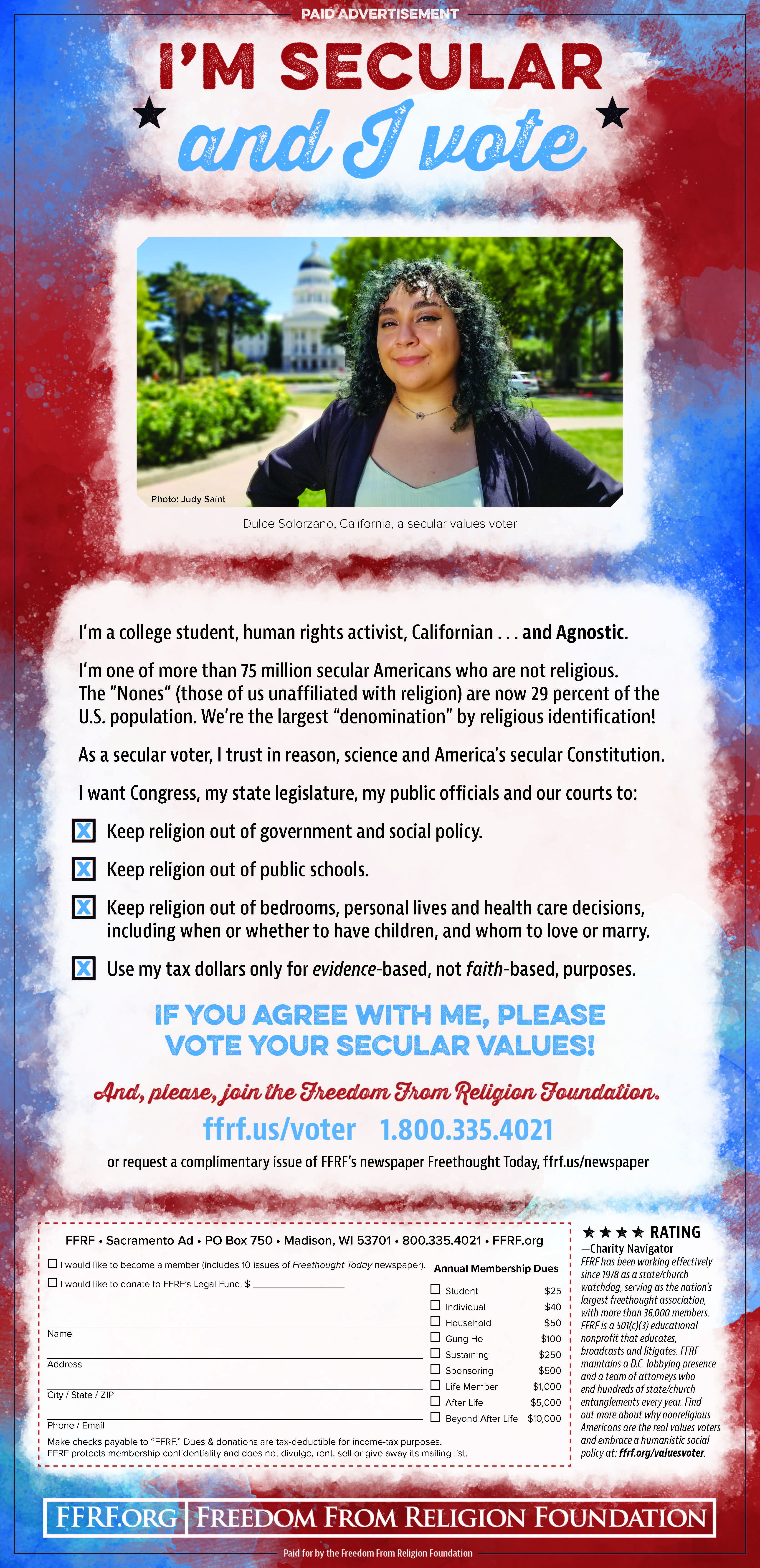
A 20-year-old college student will be featured on a billboard on K Street and 20th in Sacramento proudly proclaiming “I’m Agnostic and I vote” next month, as part of a national multimedia secular voter campaign launched by the Freedom From Religion Foundation in this critical election year.
Dulce Solorzano, representing California in FFRF’s campaign, will also be featured in a full-page ad headlined “I’m Secular and I Vote,” running in the Sacramento Bee on Sunday, July 3. She is smiling and determined-looking, arms akimbo, in front of the California State Capitol.
 Solorzano is one of 75 million nonreligious Americans who want Congress, state legislatures, public officials and courts to listen to “secular values voters” by keeping religion out of government and social policy — and that includes on the urgent question of abortion rights.
Solorzano is one of 75 million nonreligious Americans who want Congress, state legislatures, public officials and courts to listen to “secular values voters” by keeping religion out of government and social policy — and that includes on the urgent question of abortion rights.
“This campaign is a wake-up call to retake our personal choices from those using religion to take those choices away,” adds FFRF Sacramento Chapter Leader Judy Saint.
FFRF Co-President Annie Laurie Gaylor explains the secular vote campaign: “FFRF is putting public candidates and officials on notice that the nonreligious now represent nearly a third of all adult Americans, that WE are the true ‘values voters’ and that it’s time that our secular viewpoint be heard and represented.”
In the print ad, Solorzano notes, “The ‘Nones’ (those of us unaffiliated with religion) are now 29 percent of the U.S. population. We are the largest ‘denomination’ by religious identification!” Among Americans under 30, 36 percent identify as religiously unaffiliated.
In Sacramento County, the percent of adults identifying as atheist, agnostic or nothing in particular is higher than the national average at 33 percent.
Solorzano says “Being in the ‘I’m secular and I vote’ campaign will help open the conversation in the Hispanic community, creating awareness on topics less comfortable in the community, such as abortion and LGBTQ+ equality, which could hopefully help create a support system or welcoming resources for them.”
Saying she “trusts in reason, science and America’s secular Constitution,” Solorzano lists a compelling number of secular voter demands: To keep religion out of government and social policy, out of public schools, and out of bedrooms, personal lives and health care decisions — including when or whether to have children, and whom to love or marry. “Use my tax dollars only for evidence-based, not faith-based, purposes,” she emphasizes.
FFRF is running the billboards and newspaper ads in time for the Independence Day weekend in about half of the United States, with the rest appearing around Sept. 17, Constitution Day.
The campaign is particularly urgent coming on the heels of the Supreme Court decision to overturn Roe v. Wade. Gaylor observes that 98.8 percent of FFRF’s membership supports Roe, which is consistent with a YouGov analysis showing that atheists, at 91 percent overall, are the most likely to identify as pro-choice.
Gaylor called the Supreme Court trend to privilege religion, as well as the likely banning of abortion in more than half the states, alarming. “That’s why our secular voices must be heard.”
The Freedom From Religion Foundation serves as the largest association of freethinkers in North America, with more than 36,000 members including more than 5,000 in California, and works as a state/church watchdog to safeguard the constitutional principle of separation between state and church. To learn more, visit: ffrf.org.
